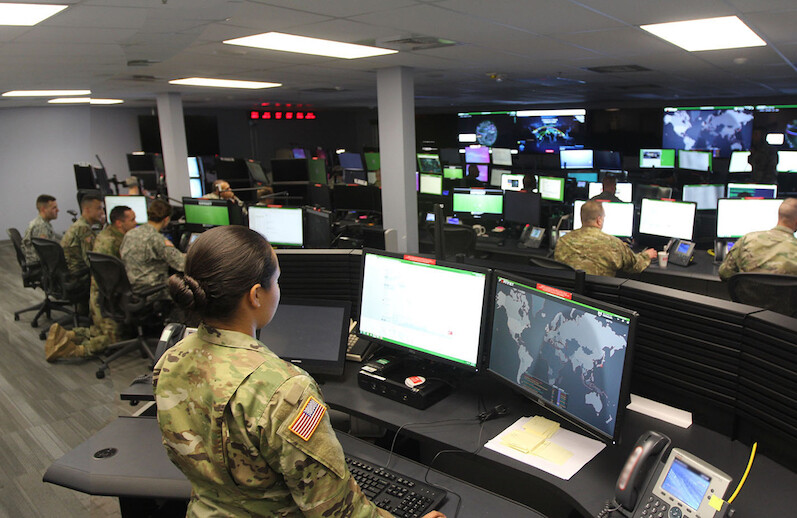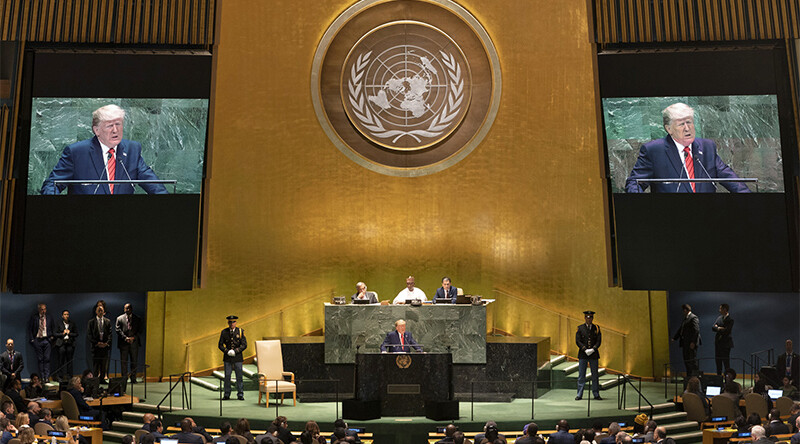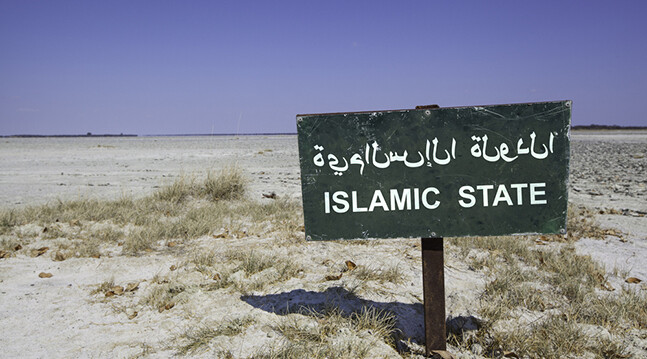National security expert Asha Castleberry-Hernandez discusses what "ISIS 2.0" means and how the terrorist group has used social media to recruit and spread its message. How has its strategy changed since the death of its leader Abur Bakr al-Baghdadi? What can the U.S. military, Congress, and executive branch do better to fight the group online?
ALEX WOODSON: Welcome to Global Ethics Weekly. I'm Alex Woodson from Carnegie Council in New York City.
Today I'm here with Asha Castleberry-Hernandez. Asha is a national security expert and U.S. Army veteran. She is currently a professor at George Washington University and Baruch College and a fellow at Foreign Policy Interrupted.
We'll be speaking about her recent article for Project Syndicate, "ISIS 2.0 and the Information War." Asha wrote that with Anne-Marie Slaughter, former director of policy planning in the U.S. State Department and CEO of the think tank New America.
This article was written before the raid that resulted in the death of ISIS leader Abu Bakr al-Baghdadi. So, this will be a chance for Asha to update some of her findings.
Asha is also a member of the U.S. Global Engagement working group at Carnegie Council, led by our Senior Fellow Nikolas Gvosdev. We just put out a report on the working group's findings from the past year. You can go to carnegiecouncil.org to find that and also to listen to several other podcasts that I've done with Asha.
Thanks so much for coming today.
ASHA CASTLEBERRY-HERNANDEZ: Thank you.
ALEX WOODSON: Let's go back to before the events of October and back to when you originally wrote your article for Project Syndicate, which was published in late September. Before Baghdadi was killed and before Trump announced his new Syria policy, what was notable about how ISIS used social media?
ASHA CASTLEBERRY-HERNANDEZ: First and foremost, I would like to start off with the Department of Defense (DoD) Inspector General report and multiple sources that indicated that ISIS was actually resurging in both Iraq and Syria. It was interesting to watch how much of it was actually building up due to many reasons. One was because our partners were having a hard time being able to hold areas, and ISIS was able to rebuild their efforts in those areas because of the lack of security infrastructure in place from our partners, both in the Iraqi Security Forces (ISF) and some involving the Syrian Kurds.
Also, you start to see some concerns with ISIS being able to go into internally displaced person (IDP) camps, being able to recruit IDP folks to actually join their efforts. So, there were a lot of different developments indicating that their resurgence was actually happening.
With that being said, as they were rebuilding they were using media outlets to support that effort. You start to see where the Abu Bakr al-Baghdadi video, which resurfaced in April 2019—I think he was in Syria. It was a video clip showing that he's still alive, ISIS is still going on, the ideology lives. That was definitely the most notable example of the resurgence.
Also, you started to see their publications start to spread around, like the "Soldier's Harvest" part two, which was pretty much promoting different weekly publications, of their effort at resurging, what they're trying to do in Iraq and Syria, and also spreading their messaging around the world.
This became a really big concern for the ongoing efforts that are going on right now with Combined Joint Task Force-Operation Inherent Resolve, and also it became a really big concern with regard to the United States government: How do we now counter this new insurgence? It goes beyond just military operations.
The purpose of my article is to argue that there is a need for a synchronization effort at the National Security Council to be able to fully utilize all their national security agencies, but in a combined effort as far as working on cybersecurity, information operations, and psychological operations. Because as of now it's all over the place; it's not necessarily synchronized.
ALEX WOODSON: Your article was titled, "ISIS 2.0," so that means that there was an ISIS 1.0. How did ISIS 2.0 differ from their original online strategy?
ASHA CASTLEBERRY-HERNANDEZ: Prior to the 2.0 argument, ISIS pretty much had a really bad counter-messaging campaign going on due to the fact that they lost so much territory. That hit them in terms of their media campaign. Their number of foreign fighters reduced drastically. The number of ISIS detainees were pretty much at these prisons that were run by the Syrian Kurds and the ISF. In terms of how much they've lost, that impacted their media campaign.
In terms of actually resurging, you start to see where they were able to rebuild in different areas and also utilize some different media tools to promote their new messaging, so that's why we called it 2.0.
ALEX WOODSON: Got it. Now we can get to the current events, the current news. Abu Bakr al-Baghdadi was killed a few weeks ago, and that has changed what ISIS has done online, changed their strategy. What have you seen in the weeks since the Baghdadi raid?
ASHA CASTLEBERRY-HERNANDEZ: I would say in terms of their media campaign they're definitely trying to put out there through social media that they're surviving. They're also trying to put out there who can be a potential successor.
The United States is actually doing pretty good, saying as part of their counter-messaging campaign: "Hey, we found a potential successor, and we're going after them." The United States along with other members of the coalition have been doing pretty good countering their messaging, but they've been able to use social media, especially WhatsApp and other various sources, to promote that they're still alive and that there is a chain of command that can be utilized to replace al-Baghdadi.
ALEX WOODSON: Another thing that I've noticed is that there are a few articles about how they're using bots, how they're using Twitter. They're hijacking social media accounts to promote their message. Have you come across that?
ASHA CASTLEBERRY-HERNANDEZ: Yes. That's also part of the 2.0 resurgence campaign. They have been able to be sophisticated in some of the media tools that they're using, and one of them is actual bots.
So, they're learning from what the Russians have done to us, and they're using that same type of strategy, of, "How are we able to create all these bots to promote our efforts and be able to do some sort of psychological operations in the United States?" That has been definitely a concern. They have become more sophisticated despite the fact that they've lost so much in terms of territory and money.
ALEX WOODSON: I was going to ask about that. I notice that it looks a lot like what Russian intelligence was doing in the 2016 election. I guess that's just a new method for actors to use on social media to get their message out.
ASHA CASTLEBERRY-HERNANDEZ: Right.
ALEX WOODSON: I definitely want to get to what the United States has been doing—good and bad—in regard to ISIS, but does ISIS have capabilities to do any large-scale hacking? I think Russia has been able to cut off electricity in Ukraine and things like that; they've apparently infiltrated the U.S. voting records in state and local elections. Does ISIS have those capabilities as well, that they can pursue terrorism online?
ASHA CASTLEBERRY-HERNANDEZ: Yes, actually they do. I remember when I was deployed in Iraq and Kuwait, and I remember when they actually were able to hack into our Twitter accounts.
I must say they still know how to do that, but because they've lost so much, their media campaign is a little more challenged. Also, we woke up to the fact that they know how to do this, so in terms of protectionism over our systems, we've been doing a lot better job in that aspect, especially when it comes to cybersecurity.
So, yes, they have the ability to do so, and they actually were able to do that in the beginning, going back to 2014. So, they're pretty much sophisticated.
ALEX WOODSON: In your article you had some fairly harsh words for the Trump administration, you and Anne-Marie Slaughter, for how they haven't done enough to really combat ISIS online. Can you explain what exactly they got wrong in terms of the ISIS 2.0 strategy?
ASHA CASTLEBERRY-HERNANDEZ: First and foremost, one of the biggest arguments that we talked about in the article is that coming from the Trump administration there was definitely some misleading information that was being provided to the American people—that ISIS was defeated. That was a win in my opinion for ISIS because the administration was communicating to the American people that they were defeated, and that was not necessarily the case when you looked at the battlefield. I think that was definitely a major argument there.
Also, when you look at how the national security agencies are working on this effort, there was no synchronization. What we argued in the article was that, "Hey, maybe we can figure out a way to build some sort of entity within the National Security Council that can synchronize all the efforts coming from the State Department, DoD, and Homeland Security that can actually help with counter-messaging and provide some sort of guidance to this effort." It was just all over the place, especially if you want to look at the fact that if ISIS was able to regain again—which they are—and be able to influence more homegrown attacks on U.S. soil. At the end of the day Homeland Security and DoD and the State Department have to work together on that effort. They have to be able to prep them, especially Homeland Security, on how we can counter those potential attacks in the United States.
Just based on our assessment, we did not see where there was this major synchronization going on within the multiple national security agencies. So, we argued that maybe the United States could look at the British model, called the 77th Brigade, where they're able to bring not only their own government but the private sector together to work on counterterrorism, and it's actually working.
ALEX WOODSON: How closely does the United States work with the British government on these efforts and maybe other governments as well?
ASHA CASTLEBERRY-HERNANDEZ: They work with them closely. They're part of the Combined Joint Task Force-Operation Inherent Resolve, so they work on counter-messaging as well as psychological operations, countering disinformation, but in terms of actually taking their model and using it, it's more on us than them. They're just recommending, "Hey, this is something you want to look at," but we're still trying to fix ourselves on whether we should do this or not.
It's a recommendation we should consider, but you also have to think about the intel sharing, how do we work with the private sector, so there are a lot of legalities and limitations that come along with it. That's why we're moving slow to actually consider the 77th Brigade model, but it's something we should definitely consider.
ALEX WOODSON: You said that the United States has done well in their response to ISIS's social media strategy since the death of Baghdadi. What exactly has the U.S. government been doing better, in your opinion?
ASHA CASTLEBERRY-HERNANDEZ: I think the optics were really good once it happened, in terms of providing information to the American people coming from the president of the United States. Again, I disagree with the fact that he gave a little bit too much intelligence, but I think it was definitely good optics for the United States that we were able to take out the ISIS leader.
On top of that, you started to see coming from the battlefield the spokesmen, many media outlets that we use in the battlefield were promoting that we actually were able to kill Abu al-Baghdadi. I think that the optics looks really good.
Now they've lost a lot of territory, their leader is pretty much out. That doesn't mean that they're gone, but I think the optics looked good coming from the coalition overall.
ALEX WOODSON: I've seen some people suggest that the way Trump talked about Baghdadi, how he died—he said he was crying and whimpering—besides the intelligence concerns, that might have galvanized ISIS a bit more than was necessary. Do you see that? Do you agree with that? Do you have problems with how the president described the raid?
ASHA CASTLEBERRY-HERNANDEZ: Yes. I think it was just a little bit too much in terms of detail, like the utilization of the dog and how Special Operations Forces were able to operate in those areas. Yes, I think it was a little too much in terms of what was said. Certain things should not be disclosed in detail, especially for the fact that it could potentially provoke some of the hotspots going on in the battlefield from those who are opposed to our efforts. So, yes, it was a little bit too much.
ALEX WOODSON: You mentioned this initiative that the United Kingdom is doing, the 77th Brigade, I believe. Are there any other governments or organizations that you've seen that—maybe not just targeting ISIS, but cybersecurity in general—you think are doing a really good job that the U.S. government could use as an example?
ASHA CASTLEBERRY-HERNANDEZ: I must say, when you look at the United States Government, especially when it comes to DoD, I won't completely say they're not really doing a good job. They're actually doing a pretty good job in trying to expedite in terms of how are they going to work on information operations.
They're right now looking into transitioning their cyberwarfare command to information operations, where they're opening up the idea of bringing different entities to join them as far as, "How can we fight this effort, not just alone in terms of the U.S. government (USG) but what are other elements we can consider within USG? For instance, how can we work with the State Department Public Diplomacy Center? What are some of the tools we need to use with them and work together?"
Previously, they had been working separately. But how does this all feed in together, and how can we build the metrics to measure our outcomes? I think you're seeing some really great things come out of DoD where they're trying to promote the idea of synchronizing between them and DoD and the Central Intelligence Agency to figure out how we can better do this. But as of now, the best model is the 77th Brigade model, and that's the only one that we're tracking.
ALEX WOODSON: I talked about this in a podcast a few months ago, the idea of a digital Geneva Convention, how the fact that something like what Russian intelligence was doing in 2016 should be out of bounds for digital operations, even when you're dealing with adversaries. You don't want to get involved in an election. There are many other things you can add to that.
Obviously, a group like ISIS isn't going to pay attention to anything like this, but do you think that is a good idea and could maybe change the environment, make it a little more safe for governments and people out there in this online world that is mostly ungoverned at the moment?
ASHA CASTLEBERRY-HERNANDEZ: Are you talking about as far as using digital—
ALEX WOODSON: Having just a Convention like the Geneva Convention, the prisoners of war, things like that, not targeting civilians. Do you think there needs to be something like that for digital warfare because we're entering this new phase of warfare where digital is a new battlefield?
ASHA CASTLEBERRY-HERNANDEZ: Yes, absolutely. I must say, working with our partners, they're thirsty to learn more about that and be able to bring the international community together to talk about that effort.
I think that's pretty interesting because if you look at the 77th Brigade model, I think that definitely needs to be part of a Convention, that they talk about this model as far as using digital techniques—podcasting, television, cyberwarfare—wrap it all together, and be able to not only go within your own government to come together but also be able to work together with other governments around the world. You're seeing that in the coalition right now, but again there are limitations. But I definitely believe that there should be some sort of Convention.
ALEX WOODSON: Last question. What are you going to be looking for in the future? ISIS is not going away, unfortunately. What are you going to be tracking in the next few months as far as ISIS's online activity?
ASHA CASTLEBERRY-HERNANDEZ: I'm definitely tracking Congress on how they're reacting to it. You're seeing that recently there's the new National Defense Authorization Act (NDAA). As far as appropriations and planning, I want to see what's going on in terms of how Congress is going to be able to work on this issue, because what was really interesting as a result of pulling out of Northern Syria, the Abu al-Baghdadi issue, you started to see where there was a bipartisan spirit where Congress is right now really serious about Syria.
They're actually surprisingly on the same page, and they're thinking about a way forward or what we need to do. So, I want to know if they're actually going to look into creating some sort of Authorization for the Use of Military Force. They've already shown some sort of consensus on how they're looking into Syria by passing that resolution after they pulled out of Northern Syria. I want to see what they have in place and what they're going to do.
I know last year under the NDAA, they actually recommended that they should have some sort of Syrian study group, where they bring in experts from think tanks, from the government, everywhere, to talk about this new strategy. I think as a result of pulling out of Northern Syria as well as the killing of Abu al-Baghdadi, you're going to see where there's going to be a big push from Congress on how we're going to resolve this issue of fighting against ISIS.
ALEX WOODSON: Do you see Congress and the executive branch being on the same page as far as this? A lot of times in some foreign policy—you look at the Russia issue and the issue with Turkey as well—Congress and the president don't really seem to be agreeing too much on the strategy. Do you think Congress and the president can get on the same page when it comes to this digital strategy that you've been mentioning?
ASHA CASTLEBERRY-HERNANDEZ: It depends. If you look at the current Secretary of Defense (SecDef) Mark Esper, if he's really serious about being able to prioritize media campaigning against ISIS, he will go to Congress and speak to them like General Mattis did, where he actually was working very closely with Congress as far as what we were doing with ISIS, so it all depends on the leadership. He's new, so we have to see what's going to happen.
I think for the most part looking at the new SecDef he may consider working with them closer because of the fact that when Mitch McConnell came out and wrote that article, saying, "Hey, it is not good that we pulled out of Northern Syria," you did see where the SecDef made some changes, where he didn't completely pull out of Syria, but he just kind of reorganized our posture there, especially prioritizing the oil fields, sending troops there and other parts, too.
I think they're paying attention to what Congress wants, especially when it comes from the Republicans, so I think they'll look into prioritizing the media campaign, but only if the SecDef prioritizes it and he's on the same page with Congress about it.
ALEX WOODSON: Okay. I guess we'll have to have you back to talk about the future of this issue.
Thank you so much.
That was Asha Castleberry-Hernandez. I'm Alex Woodson. Thanks for listening to Global Ethics Weekly.




